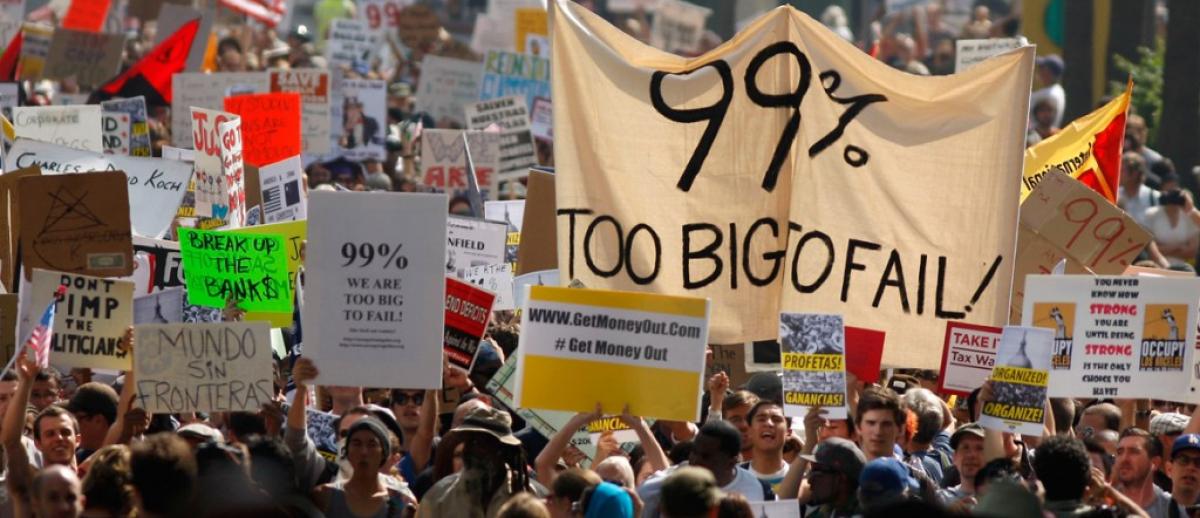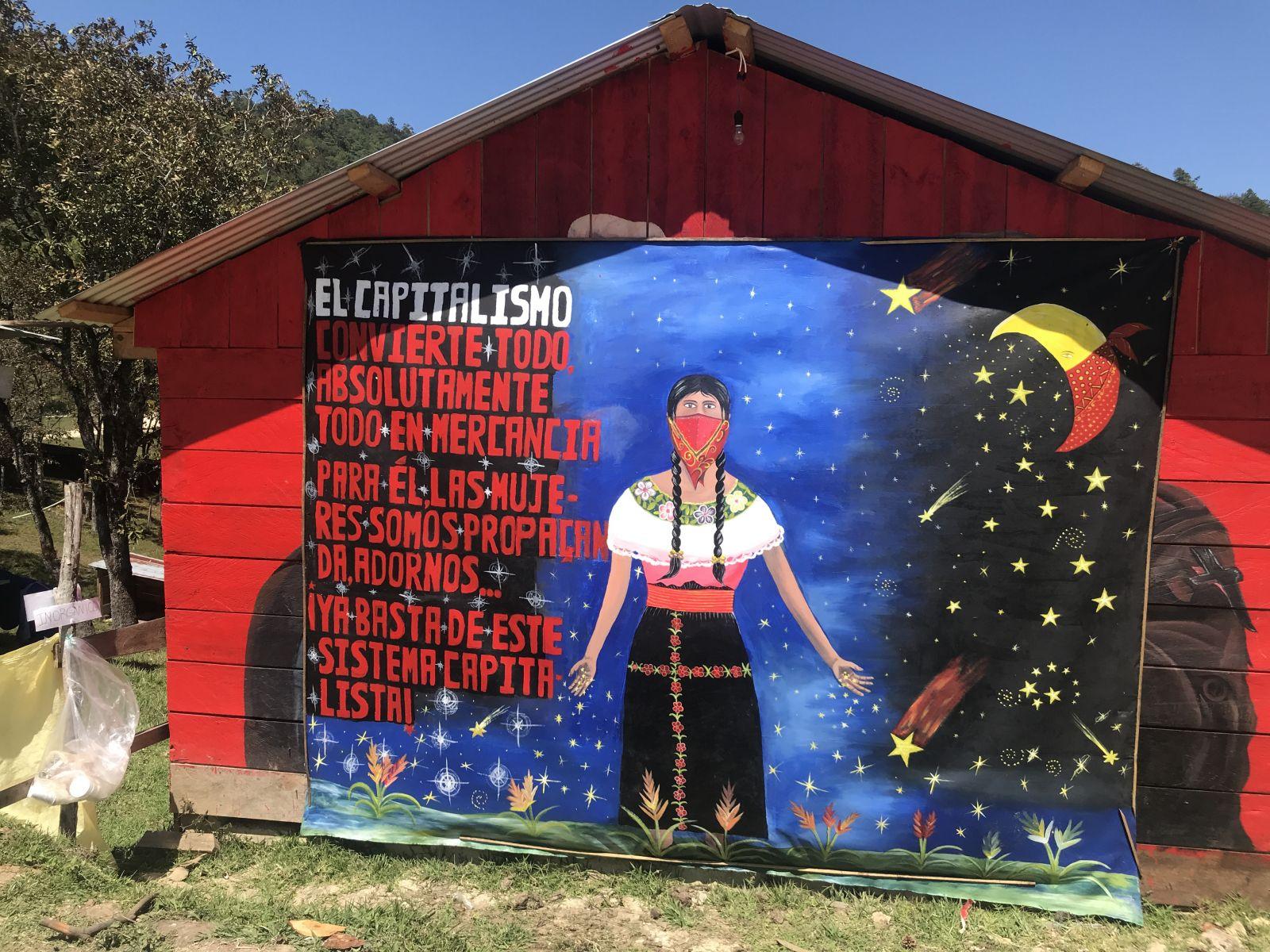Challenging Neoliberal Hegemony: Ideology for 21st Century Progressives
archive


Challenging Neoliberal Hegemony: Ideology for 21st Century Progressives
Neoliberalism—“a political economic philosophy… dedicated to the extension of market (and market-like) forms of governance, rule, and control across… all spheres of social life”1—has, from the 1970s onwards, exerted its ever more expansive power over societies worldwide. Neoliberalism has not gone unchallenged, of course, with resistance materializing on many occasions both in the Global South and North. Early eruptions of discontent include the 1977 Egyptian “Bread Riots” and the 1989 insurgence in Venezuela. In 1994, in Chiapas, Mexico, the Zapatistas rose against impending introduction of NAFTA. In the Global North, the “alter-globalization” movement became (in)famous for its well-choreographed protests, most notably in Seattle in 1999. Globally, World Social Forums have provided a space for activists to discuss alternatives to the neoliberal system since 2001. Such mobilizations have drawn attention to the obscene inequality and environmental degradation for which neoliberalism has been held responsible, but have not stopped its global diffusion.
With the 2008 financial crisis, it seemed that an unprecedented opportunity opened up for the challengers of neoliberalism. Mass-scale mobilizations took place first in the Arab World, then in Europe (Indignados), and finally in the US (Occupy). Much has been written about the character of these movements, the reasons why it took them so long—roughly four years—to organize following the crisis and, especially, whether they have made any meaningful difference. Most commentators remain unconvinced and have pondered a plethora of reasons for the underwhelming impact of this most recent wave of global protest. However, while useful insights have been drawn from such reflection, the role of ideology is rarely considered, reflecting a widely held belief that we live in a post-ideological age.2 This gap should be urgently addressed, and the end-of-ideology discourse exposed as a hoax. Only then will anti-neoliberals stand a chance to effectively confront their adversary.
Ideology as a system of interdependent, action-oriented political beliefs underpins any and all political praxis. Why, then, is the claim that ideology has become irrelevant so influential? The notion is useful to neoliberal elites as it helps to dissimulate, naturalize, and dehistoricize today’s global capitalist system. But it is a paradox, and a manifestation of the hegemony of neoliberalism, that many of its challengers, both in alter-globalist movements of the 1990s and the recent anti-austerity mobilizations, have taken neoliberal pronouncements of ideology’s decline at face value and hence made little effort to articulate a coherent political vision of their own. Instead of a systematic analysis of the current economic system, they relished in a moralistic condemnation of individual greed. Meanwhile, their fixation on prefigurative politics has focused the movements’ attention on the experience of activism itself rather than working out systemic alternatives to the realities outside the spaces of encampment, protest, or riot.3
Still, evading explicit ideological work does not mean that ideas cease to make the world go round; it only means that the ideas of others prevail. To move towards forming a counterhegemonic movement with a real potential to challenge neoliberalism, anti-neoliberal activists and intellectuals should start taking ideology seriously. But what kind of ideology would be conducive to this goal while also remaining compatible with the extremely heterogeneous nature of anti-neoliberal politics? Only a very general and tentative set of criteria can be laid out here. “Unity in diversity” may be a clichéd slogan but it captures the nature of an ideology that would fit the gestalt of contemporary activism. Diversity may be about bringing together a number of different ideological perspectives into one broad movement, and an ongoing debate revolves around the extent to which any such combination is possible. A related question centers on how concerns typical of the politics of identity can be brought into dynamic interplay with more traditional foci such as class. Finally, Western political ideas should be enriched by the incorporation of non-Western influences into the movements’ arguments and actions—a necessity if anti-neoliberal activism is to live up to its cosmopolitan sense of itself.
...evading explicit ideological work does not mean that ideas cease to make the world go round; it only means that the ideas of others prevail.
Let me elaborate briefly. The first dimension of diversity revolves around the question of how anti-neoliberal activists might benefit from the coexistence, often tense, of various ideological influences within what is often abstractly projected as one movement. Such ecumenical amalgamation is yet to be achieved. At present, sharp divisions persist especially between socialist and anarchist currents, usually without any reference to the ideological labels themselves. Activists’ awareness of the common origin of these two political traditions and their conceptual overlaps remains hazy. To facilitate the formation of ideological counter-hegemony a more systematic effort is needed to reclaim and reconcile the rich range of progressive ideas available within some of modernity’s main ideologies. The “tyranny of the present” inclines us to be biased in favor of a fundamental rupture with the past. Yet, it would come as a surprise to many activists today to learn how much continuity there is between the dilemmas that they face and those encountered by their forerunners in the last two centuries or so. As Mark Twain is supposed to have said, history does not repeat itself, but it rhymes. Progressives today would do well to learn from the history behind their ideas rather than trying to reinvent the wheel.4
The second dimension of diversity has to do with identity-related concerns. The question here is whether they rejuvenate or hinder effective political action. On the one hand, prioritizing identity issues may lead to division of anti-neoliberal politics into many particularistic mobilizations, each concerned with its own issue—race, gender, or sexual orientation—hence precluding formation of an overarching front of resistance. On the other hand, progressive politics would not deserve to be characterized as such if it were to imply a return to a world of monolithic and ascribed identities. The hope that it is possible to incorporate identity-related considerations into counter-hegemonic politics while avoiding, or at least minimizing, its fragmentation is shared by a growing number of voices on the left.5

“Capitalism converts everything, absolute everything into commodities. For it we women are propaganda, decorations… Down with this capitalist system!” Cancun, Mexico. (Source: Global Justice Now)
Finally, genuine ideological pluralism must entail openness to non-Western perspectives. This postulate concerns relations of domination and subordination, and ways of subverting them, between the core and the periphery of the global system. It follows that the effort to form an effective counter-hegemony needs to include ideological legacies of the South. Expanding the ideational scope of anti-neoliberal activism by opening it to varied cultural influences would likely increase its appeal globally.6 At the same time, however, embracing non-Western ideas should not imply a dismissal of the established ideologies of modernity but rather their creative reconfiguration in the process of a decolonial decentering.7
This, then, is the threefold nature of diversity that anti-neoliberal activists would do well to pursue: diversity of ideational inputs from established ideologies, diversity of identities that should find expression within the spaces of activism, and cultural diversity consisting in cross-fertilization between Western and non-Western ideas. But, as already noted, pluralism must be a source of collective strength rather than a centrifugal force undermining the pursuit of shared goals. Celebration of the variety of political stances, identity considerations, and cultural influences calls for a concurrent pursuit of the greatest possible synergy between them so that pluralism does not turn into balkanization thwarting solidarity between different mobilizations. Ultimately, activism today has to stand for something and its respect for diversity must be balanced with a determined search for unity. This is necessary in the context of an unprecedented concentration of power under the control of neoliberal forces.
...embracing non-Western ideas should not imply a dismissal of the established ideologies of modernity but rather their creative reconfiguration in the process of a decolonial decentering.
The question, then, is what can help bring different anti-neoliberal mobilizations closer together. Three elements spring to mind. First, a determination to identify the source of the problems that the movements struggle against is essential and the very heart of radical politics. Anti-neoliberalism points in the right direction but also prompts many questions: what are the origins of neoliberal hegemony, its weak points, its institutional support, etc. Definitive answers are unlikely, but a focused deliberative process would help sharpen the movements’ understanding of the adversary and attune their approaches accordingly. Systematic analysis of political realities cannot be evaded in favor of moralistic platitudes, at least not without a heavy political price.
A vision of the alternative world is the second dimension. This is not to suggest a rigid doctrine but to argue that political action requires a clear and enticing idea of what the transition away from neoliberalism would mean. Corny phrases, like “people over profits,” combined with refusal to formulate demands, meant that little of substance has been forthcoming from within the spaces of anti-neoliberal activism in the aftermath of the recent crisis. This needs to change if anti-neoliberals are to seize the next political opportunity.
Finally, there is the question of how to get from here to there, what strategy to pursue. Again, there are many options, each of them carrying heavy political implications. But what is clear is that if anti-neoliberal movements want to have any impact on the world then they will need to work out ways of actually engaging with it rather than remaining in an autonomous bubble of their own making.
In a nutshell, what is needed is an ideological vision, one open to constant revision and reinterpretation but debated overtly rather than an implicit and suppressed one. Their abandonment of overt ideology has left anti-neoliberal movements significantly less able to confront the powerful system of neoliberal capitalism. After all, it is clear that they cannot match the material might of neoliberalism’s main constituencies, the corporation and the transnational capitalist class, and so their main asset is their capacity to think beyond what is empirically given and their power to shape collective imagination. The left used to excel in its ability to carve out compelling visions. Unfortunately, for some time now, left-wing progressivism has been punching below its ideational weight. The sooner anti-neoliberal movements take this onboard, and engage in serious ideological work, the greater their chance of eventually destabilizing the neoliberal project.
_________
This short essay is based on the author’s recently published book, Ideology and the Future of Progressive Social Movements. (London and New York: Rowman and Littlefield, 2018)
1. Peck, Jamie and Adam Tickell (2007). “Conceptualizing Neoliberalism: Thinking
Thacherism”. In Helga Leitner, Jamie Peck and Eric S. Sheppard (eds) Contesting Neoliberalism: Urban Frontiers. London: Guilford Press, p. 28.
2. For a critical discussion of the end of ideology thesis, see Freeden, Michael (2005). “Confronting the chimera of a ‘post-ideological’ age.” Critical Review of International Social and Political Philosophy, 8(2), 247–262. For a beginner’s introduction to ideology see: Freeden, Michael (2003). Ideology. A Very Short Introduction. Oxford: Oxford University Press.
3. A critical evaluation of prefigurative politics is available in Soborski, Rafal (2019). “Prefigurative Politics in Anti-Neoliberal Activism: A Critique.” Perspectives on Global Development and Technology 18(1-2), 79-92.
4. Soborski, Rafal (2013). Ideology in a Global Age: Continuity and Change. Houndmills, Basingstoke: Palgrave Macmillan.
5. For example Fraser, Nancy (2013). “A Triple Movement.” New Left Review 81, 119–132.
6. Smith, Jackie (2014). “Counter-hegemonic networks and the transformation of global climate politics: rethinking movement-state relations.” Global Discourse: An Interdisciplinary Journal of Current Affairs and Applied Contemporary Thought, 4(2–3), 120–138.
7. Buck-Morss, Susan (2003). Thinking Past Terror: Islamism and Critical Theory on the Left. New York: Verso, 99.



